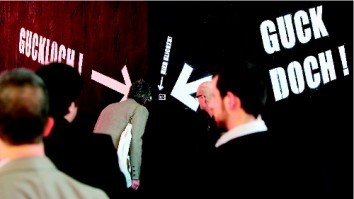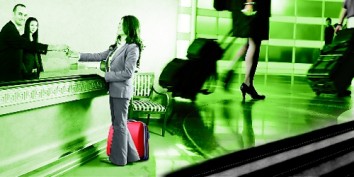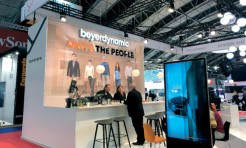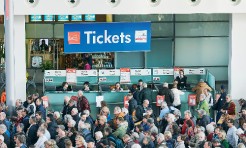FAMAB Award: The revenge of the champagne
Last November the FAMAB Awards were conferred in Essen
for the first time. New major categories replaced Adam and Eva.

The new FAMAB Award honoured exhibition presentations in the field of “architecture” again, but not according to size anymore. Nevertheless, large and small stands were once again distinguished. Thus the category “Best Stand Smart” recognised exhibition presentations that generated a lot of attention with a superior concept despite adverse conditions. This was won by the stand of the German Wallpaper Institute at imm cologne. Even from a distance the “wallpaper house” with its black and white wallpaper skin drew visitors' attention and allowed the first exciting insights – in and through the rooms. Inside, guests were immersed in four different room presentations. The concept was based on a study that defined the four basic characteristics of wallpaper buyers: the cavalier, the prestige-conscious, the pragmatic, and the wild creative.
Stand concept and design was the responsibility of the interior design office raumkontor from Dusseldorf: floor, walls, ceiling, lighting, furniture, and accessories in each room scene were completely overlaid with a wallpaper design. However, the room was also fragmented and even a bit surreal. Bright orange fish surrounded the viewer on all sides in the “bathroom” (wild + creative type). In the “living room” the surreal was poured out – tongue-in-cheek – in gold over the room space and interior (the prestige-conscious). In the “bedroom” the bed and pyjamas were severly striped (pragmatic type). And in the “kitchen” a cutlery installation softly clinked and floated in the breeze (the cavalier). People camouflaged with paint over their entire bodies were integrated in this unreal scenario too. The positive response from visitors and the media showed that a stand’s success is not dependent on a large budget (www.raumkontor.com).

An unusual trade fair presentation was achieved by Holtmann from Langenhagen near Hannover at the EuroShop 2014 in Dusseldorf. The company wanted to convince the discerning target group of agency representatives, designers, architects, and marketing executives of its competence. To this end Holtmann relied on recognition and surprise at the same time. The stand concept developed in collaboration with the Berlin agency raumHoch seemed daring from the outside – in the midst of high-calibre competition the stand appeared only as a dark cube. But a peephole in a corner of the stand proved to be irresistible. It attracted visitors magically and allowed a first inside view: a schematically depicted living room decorated with images of projects.
Inside the Holtmann stand, the image dissolved into corners and edges, losing its coherence. Because the optical effect, known as anamorphosis, allowed the room to make sense visually only from a single angle: the peephole. This effect stunned visitors and raised questions, while the narrow spaces offered additional exciting perspectives. At the same time, the cosy interior in retro-style invited visitors to stay and established a reference to the company.
In addition to the award for events (formerly Eva), the category “Cross” was introduced at the FAMAB Awards with other new ones. It honoured the initiators of interdisciplinary and networked projects, such as the Hamburg Wine & Champagne Company (Hawesko). Germany's leading wine merchant is well-known among champagne connoisseurs, but not by the general public. That was to be abruptly changed on occasion of the firm’s 50th anniversary. The aim was to strengthen Hawesko’s market position in the champagne segment. And the interest of people should be aroused who had never heard of Hawesko. Champagne – people automatically think of luxury and joie de vivre. But it also has another, darker side: For centuries, the noble beverage has been wantonly and brutally destroyed at ship christenings around the world: It was simply time to finally stand up, high time for “The Revenge of the Champagne”.
No sooner said than done; the tables were turned. Not the bottle christens the ship, but the ship christens the bottle. This required a live event in Hamburg’s fishing port with invited guests. During it, the “Champanic”, a Riva boat replica, was destroyed against a 17-meter-high and 20-ton heavy Hawesko Pommery Anniversary bottle. Towed by a barge in the harbour into position, the boat was first raised by a 30-meter crane in front of the bottle and then held by a separate cable structure towards the rear. With their cell phones the guests of honour gave the decisive impulse by SMS vote – and 1.5 seconds later the boat was smashed against the champagne bottle in a wild finale with music and fireworks. Revenge was achieved, the bottle had won. And Hawesko brought itself as a premium brand to the attention of a wide international audience, thanks to a live event, online transmission, and broad-based public relations activities (www.famab-award.de).
25 years of TEST – Travel Event Service Team

TEST / TEST Berlin celebrated its 25th
anniversary last year. The full-service agency with offices in Dusseldorf and
Berlin provides services in the areas of business travel and event management.
In 1989 Bernhard Käselau founded the Travel Event Service Team in Dusseldorf –
an agency that specialised in the needs of hotel room allocation for German and
international corporate clients. Its close cooperation with customers soon earned
the agency, renamed TEST GmbH, substantial growth. This was followed in 1990 by
the establishment of TEST Berlin GmbH under the management of Elizabeth Unger, which
still operates independently today. Thanks to their constant cooperation, TEST
and TEST Berlin have developed into an integrated provider with 50 employees. Besides
the core business of hotel room reservations, the agency offers comprehensive
services for exhibitions, conferences, meetings, and events at home and abroad.
They offer the experienced and reliable organisation of events and realisation of
conferences – as well as customer-oriented design and implementation of
company-specific events with up to 10,000 participants. In response to the
growing demands in the sectors of business travel and business meetings, TEST
provides customers with web-based services: a booking platform with daily-updated
hotel deals and high quality in the organisation and realisation of participant-intensive
events – with the software TEST Meeting Manager, which permits costs-saving and
time-saving handling (www.hotelreservation.de).
Author: Peter Borstel
This article was published in TFI issue 1/2015
Share in Facebook, Twitter or Google+:
TFI - Trade Fairs International - The International Trade Fair Magazine.
© 2006 - 2024 by TFI-Verlagsgesellschaft mbH. All rights reserved. TFI-Verlagsgesellschaft mbH shall accept no responsibility for the contents of external links and other contents.
TFI-Know-how
-
What to do when things go wrong at virtual or in-person events?

In the event world, it’s simply part of life if things don’t work out as planned.
-
How can networking be made to work at online events?

Networking typically happens at real, in-person events. But it’s also possible to do it online; it just works a little differently. There are various options available to organisers.
-
How can exhibitors stand out at trade fairs?

New products and a well-conceived stand design are not the only drivers for a successful presence. Many other factors are also important, but trade fair planners often lose sight of them.
-
How can industry decision-makers be reached online?

Trade fairs and trade fair companies need to constantly further develop, become more agile and flexible and offer services all year round. New, digital offerings are very important here. With its TrustedTargeting technology, Messe München offers its customers access to leading business-to-business decision-makers on the Internet.


